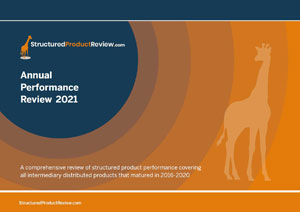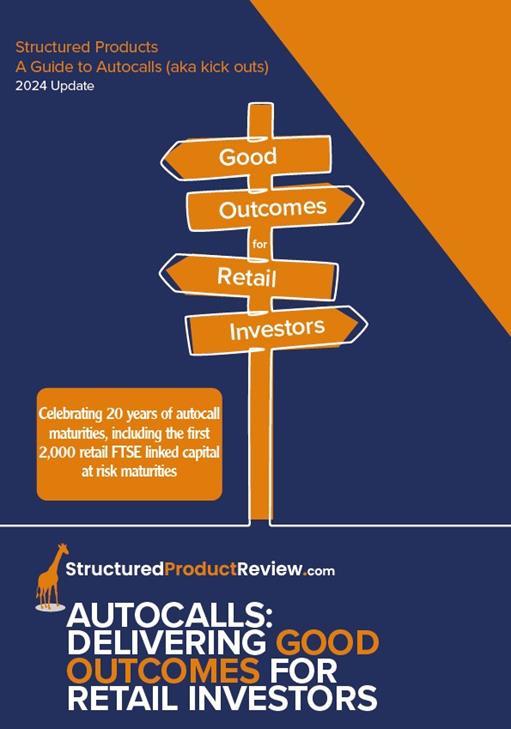06/12/2023
The UK retail structured product market over the last two decades has generally revolved around similar themes with gradual improvement, nudged by a number of regulatory interventions. Over the last ten years the structured product market has become one of the UK’s best kept investment secrets, however there were certainly some questionable offerings back in the early days.
The second autocall issued in the UK space back in 2003 was the Nvesta Accelerator Growth Plan, and by 2006 there were a total of four plans in this series. They each had a six-year maximum term, and could mature on any anniversary. As with modern plans these were subject to counterparty risk, and offered some protection through a barrier observation level. However, unlike with most modern retail plans which have a European barrier, meaning it is only measured on the final observation date, these had an American barrier, meaning capital would be lost if the index fell below the barrier level in the last year, for Growth Plan 1, or any point during the product term (for Plans 2, 3 and 4) and then failed to recover to the required observation level before the final observation date.
The Nvesta contracts offered double digit coupons, but were in the form of a step-up contract – the maturity trigger increased each year (as opposed to the step-down contracts that are commonly seen today). Where an at the money autocall requires the index to be at or above the strike level on any observation date for positive maturity, the Nvesta Accelerator Growth range used a hurdle, meaning the underlying index must grow from its starting level (or be at or above its starting level for Growth Plan 4) before a maturity could be triggered. Unlike modern iterations, however, if they failed on the first observation the required level would rise on the second anniversary. Nvesta Accelerator Growth Plan 1 required a 6% rise in the FTSE 100 to kick-out in the first year, rewarding investors with a 12% gain. If early maturity was not met, on the second anniversary the FTSE 100 would have to rise 12% from the starting level, rewarding investors with a 24% gain, and so on until the sixth year.
Fortuitously the risk did pay off with each of the four Nvesta Accelerator Growth plans maturing early on their first or second anniversaries, returning investors’ original capital in full with returns ranging from 10% - 24%.
Despite these positive outcomes, when we back-test the Nvesta 6% per year step-up hurdle pay-off profile, we can see that the plan would have matured positively in just 66.4% of all possible start dates (excluding those where the plan is yet to reach the first kick-out opportunity) since the FTSE 100’s inception. Whilst we know that past performance does not give indication of any future results, luckily step-up contracts of this type are no longer seen in the retail sector.
Looking at today’s main market linked autocalls, we see a consistent design and regular offerings from providers, backed up with over twenty years of success. Only 13 FTSE 100 only linked, capital at risk autocalls have failed to mature without any gains, so it is easy to see why the plans on offer have evolved over time, and why providers are now sticking to what works.
Currently available UK retail structured products can be found here.
All data and product information sources from StructuredProductReview.com
Structured investments put capital at risk.
Past performance is not a guide to future results.
Also in this section
- How old is too old? Are structured products to die for?
- Product focus - October 2024
- Q3 2024 Issuance
- Q3 2024 maturity results
- A share of spread bets on steroids?
- Product focus - September 2024
- Maturities of the month - August 2024
- Right on time
- Product focus - August 2024
- Keep calm and zoom out
- 2,000 and counting
- Q2 2024 maturity results
- 20 years of autocall maturities
- Product focus - June 2024
- Fixed income or interest?
- Maturities of the month - May 2024
- The barrier debate - revisited
- Product focus - April 2024
- Maturities of the month - April 2024
- Time to call
- I don't believe markets are ever too high for Structured products!
- Notes on counterparty exposure
- Return of Nikkei
- Q1 2024 issuance
- Q1 2024 maturity results
- Structured Products – AAAAAGH!
- Hop in CIBC
- Re-enter Santander
- How to build a financial fortune - revisited
- Issuance in 2023
- Where's the risk?
- Questionable offerings
- Challenging the case against structured products - 'Loss of dividends'
- Navigating the investment landscape
- Challenging the case against structured products - Counterparty risk
- 6-year autocalls approaching final destination
- 1,750 FTSE capital at risk autocall maturities
- The leopard that changed her spots
- Q3 2023
- Challenging the case against structured products - Keydata
- Dilemmas for UK IFA's and the unique role of Structured Products
- 'High charges'
- Precipice bonds
- Intro
- FTSE 100 Contingent Income
- Indexing the indices
- Something different
- Investing through volatility
- 100 10:10s
- The best or worst?
- The 10%/25% 'Rule' that never was
- Structured products and the yield curve
- Fixed income: Capital at risk?
- Prospects for UK inflation - and fun with A.I!
- The Barrier Debate
- More Deposits for now
- Last of the Americans
- What if?
- Time heals all wounds, we hope...
- How to diversify portfolios using structured products?
- The Proof Is In The Pudding...
- Debunking Structured Misconceptions
- 1,500 FTSE Capital-at-Risk Autocall Maturities
- Q3 2022 Maturity Results
- What do we prefer?
- Deposits vs Capital ‘Protected’
- There’s time yet…
- Where did you invest your clients?
- A Six-Month Reflection
- Return of the Rev Con
- Happy 2nd Birthday FTSE CSDI
- Q2 2022 Maturity Results
- The best and worst yet still the best
- Critique my Suitability - Mariana 10:10 Plan June 2022 (Option 2)
- 10/10 for 55 10:10’s
- Q1 2022 Maturity Results
- 'How to build a financial fortune': a follow up
- Critique my Suitability - Mariana 10:10 Plan April 2022 (Option 2)
- 2021 Capital-at-Risk Autocall Maturity Review
- An unwelcome return...
- CSDI's First Birthday
- Bon Anniversaire
- Introducing the FTSE Custom 100 Synthetic 3.5% Fixed Dividend Index
- Q3 2021 Maturity Results
- Critique my Suitability - Mariana 10:10 Plan October 2021 (Option 2)
- Blurring the lines...
- Beware of false knowledge; it is more dangerous than ignorance
- Good news, bad news...
- Certainty is Certainly a Benefit
- Critique my Suitability - Mariana 10:10 Plan September 2021 (Option 2)
- A Twenty-Year Progression
- Q2 2021 Maturity Results
- Nine 8:8s Post Positive Returns in Falling Markets
- Critique my Suitability
- Q1 2021 Maturity Results
- Morgan Stanley’s Marvelous Maturity Medley
Current Products
We review the UK's retail structured investment sector, providing pertinent support for Professional Advisers and relevant research tools.
View all ⟶


